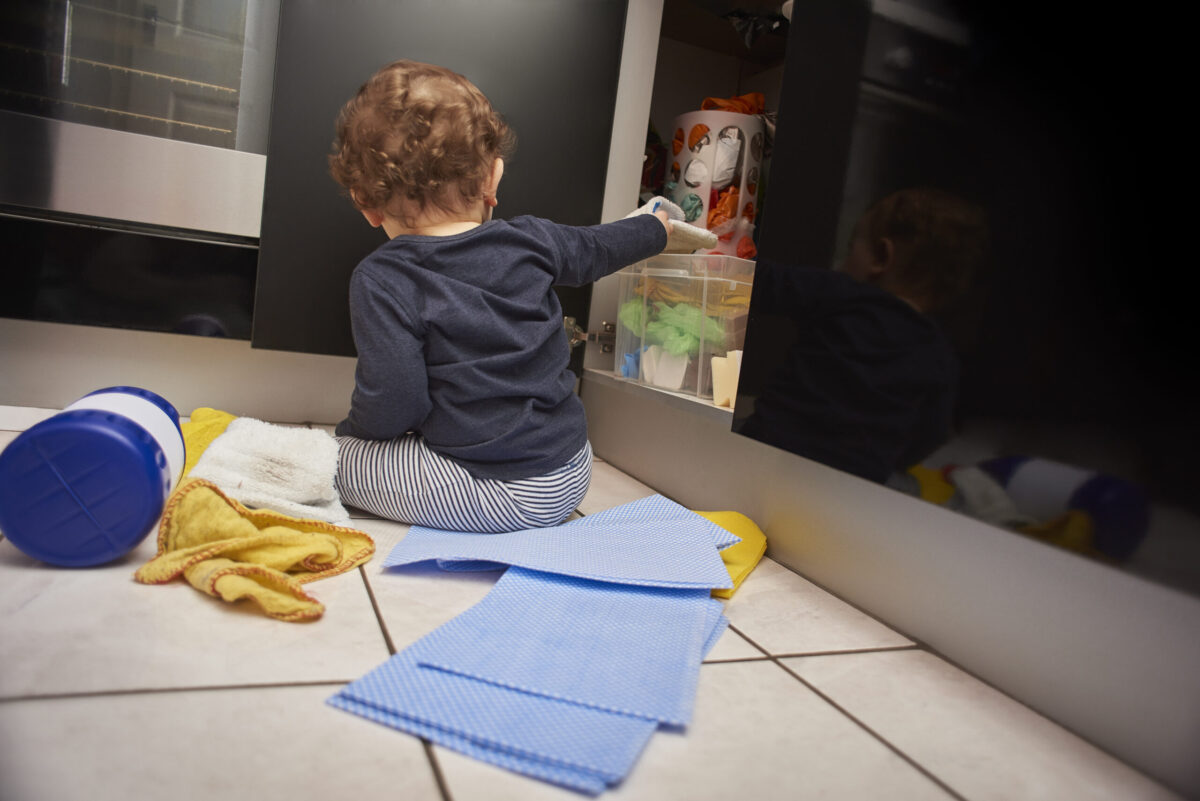Many of us store cleaning products under the kitchen or bathroom sink. Here, they’ll be accessible when we need them. But, those locations are often within reach of toddlers or pets. Unfortunately, they can’t tell the difference between a colorful toy and a dangerous liquid.
“It’s important to protect those in your home from potentially dangerous substances,” says Dr. Sharon Moore-Caldwell, a medical director with BlueCross BlueShield of Tennessee. “There are so many things that we can’t control in life. But we do have the opportunity to control what we store in our homes so we can prevent potentially tragic events from occurring.”
Know what substances are stored in your home
Dr. Moore-Caldwell: The vast majority of poisonings are unintentional, and most of them occur in children under the age of 6.
The first step in preventing a poisoning is to take an inventory of all potentially dangerous products you have in your home and where they are located.
Potentially dangerous products in your home include:
- Cleaners. This includes your standard household cleaners, including antibacterial sprays, drain cleaner, bleach, toilet bowl cleaner, and oven cleaner. Don’t forget about rug and carpet cleaners, which can contain substances like ammonium hydroxide, perchloroethylene, and naphthalene, or furniture polish, which may contain ammonia, nitrobenzene, or phenol.
- Detergents. Chances are, you have dish and laundry detergents in your home.
- You might have old cans of paint, spray paint, and substances to remove paint, stored in your garage or utility room.
- Pesticides and insecticides. This includes weed killers, insect repellants, ant-and-roach spray, household foggers or “bug bombs,” as well as other chemicals that are designed to keep pesky critters at bay but could be toxic if ingested or inhaled.
- Auto supplies and other substances. You might have accumulated some motor oil, antifreeze, windshield wiper fluid, and other auto supplies in the garage, as well as substances like pool cleaner or lighter fluid for a grill.
All of these could cause serious harm if a child or animal finds them and ingests them.
Develop a plan to store substances safely
Dr. Moore-Caldwell: Once you know what you have, it’s time to make sure that everything that’s potentially hazardous is stored safely and securely away from children and pets.
Cabinet locks and other safety mechanisms could potentially save a life. You might assume that it’s enough to tell a young child “Don’t touch,” but it’s not. Children are naturally curious, and they’re always watching.
Plus, it’s important to remember to return items to their locked storage places after you use them. It’s easy to get distracted and put something down and then forget to return it to storage. Make sure that all lids and caps are securely closed, then return the item to its proper location.
Another tip: always store cleaners and other products in their original containers. Don’t remove the labels, as they also include safety information, and never store anything in a food container that’s not actually food. It could lead to a very harmful case of mistaken identity.
Don’t forget to store medicines safely, too
Dr. Moore-Caldwell: Don’t forget about the medications stored in your medicine cabinet. Is your medication cabinet secured so no one (but you) can get into it? If not, it’s time to address that. Medicine should never be accessible to children. (Hint: don’t store meds on your nightstand, either.)
Also, if you have old medicines that you no longer use, it’s time to get rid of them. As the Food and Drug Administration cautions, what’s safe for you might be harmful for someone else, so you want to be careful about disposing of them safely. You can look for a Drug Takeback Program or check with your pharmacist to ask about the options for disposal in your community.
Find a drug takeback box in Tennessee
The FDA also maintains a resource about medications that are safe to flush (hint: many aren’t!). Whatever you keep, be sure they’re stored safely out of the reach of young children and pets.
CDC guide to storing and use of medicines
If a substance may have been ingested, contact Poison Control
Dr. Moore-Caldwell: If you have questions about a potentially toxic substance or you’re worried that someone in your home may have ingested one, contact Poison Control right away. You can call the Poison Control hotline at 1-800-222-1222. Experts often recommend displaying the poison control number prominently in your home. You might also consider programming the number into your phone, too. Also, you shouldn’t hesitate calling 911 in emergencies.
The bottom line is that we have a responsibility to secure our homes so that the youngest people and pets there are safe. Being proactive with simple storage steps can help achieve that goal.
More from Dr. Moore-Caldwell on WellTuned.
Get more information about specific health terms, topics and conditions to better manage your health on bcbst.com. BlueCross BlueShield of Tennessee members can access wellness-related discounts on fitness products, gym memberships, healthy eating and more through Blue365®. BCBST members can also find tools and resources to help improve health and well-being by logging into BlueAccess and going to the Managing Your Health tab.





